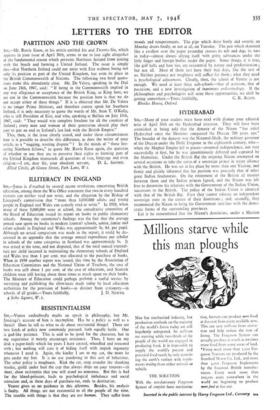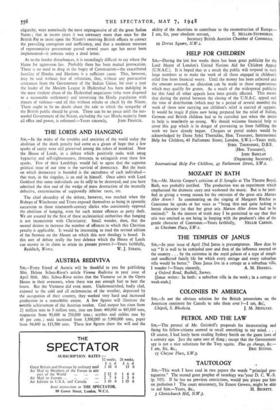HYDERABAD
Sta,—Many of your readers must have read with dismay your editorial note of April 30th on the Hyderabad situation. They will have been astonished at being told that the dynasty of the Nizam " has ruled Hyderabad since the Moslems conquered the Deccan 700 years ago." The founder of the dynasty was the Nizamul-Mulk, the military governor of the Deccan under the Delhi Emperor in the eighteenth century, who— when the Moghul Empire fell to pieces—assumed independence, not very successfully at first, for he was ignominiously defeated and captured by the Mahrattas. Under the British Raj the reigning Nizam attempted on several occasions to take the status of a sovereign prince in treaty alliance with the British. He was set in his place by more than one Viceroy, and firmly and plainly informed that his position was precisely that of other great Indian feudatories. On the retirement of the British all treaties between them and the Indian princes lapsed, and the Nizam was left free to determine his relations with the Government of the Indian Union, successors to the British. The policy of the Indian Union is identical with that 'of the British Raj. First they cannot tolerate an independent sovereign state in the centre of their dominions ; and, secondly, they recommend the Nizam to bring his Government into line with the demo- cratic forms of the surrounding provinces.
Let it be remembered that the Nizam's dominions, under a Moslem
oligarchy, were notoriously the most unprogressive of all the great Indian States ; that in recent years it was necessary more than once for the British Raj to insist upon the Nizam's receiving British officers to correct the prevailing corruption and inefficiency, and that a moderate measure of representative government passed several years ago has never been implemented—it remains today a dead letter:
As to the border disturbances, it is exceedingly difficult to say where the blame for aggression lies. Probably there has been mutual provocation. There is no need to drag in the bogey of Communism—the exacerbated hostility of Hindus and Moslems is a sufficient cause. This, however, may be said without fear of refutation, that, without any provocative utterances from the Government of the Indian Union, for over a year the leader of the Moslem League in Hyderabad has been indulging in the most virulent abuse of the Hyderabad negotiators (who were disposed to a reasonable settlement) and terrorising the Hindu population with threats of violence—and all this without rebuke or check by the Nizam. There ought to be no doubt about the side to which the sympathy of the British public should be given. There can be no peace until the out- moded Government of the Nizam, excluding the vast Hindu majority from
all office and power, is reformed.—Yours sincerely, JOHN FRANCIS.



































 Previous page
Previous page